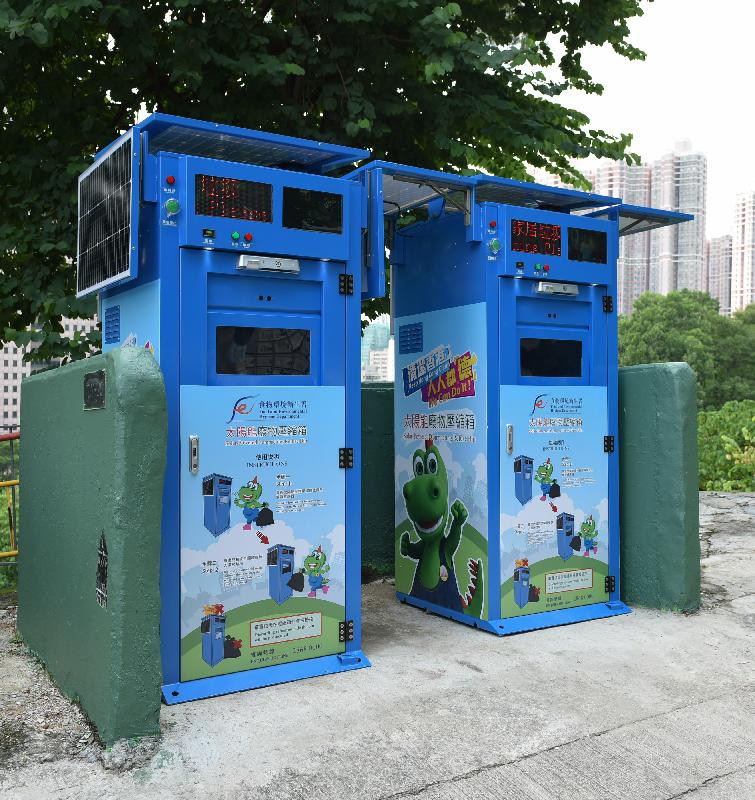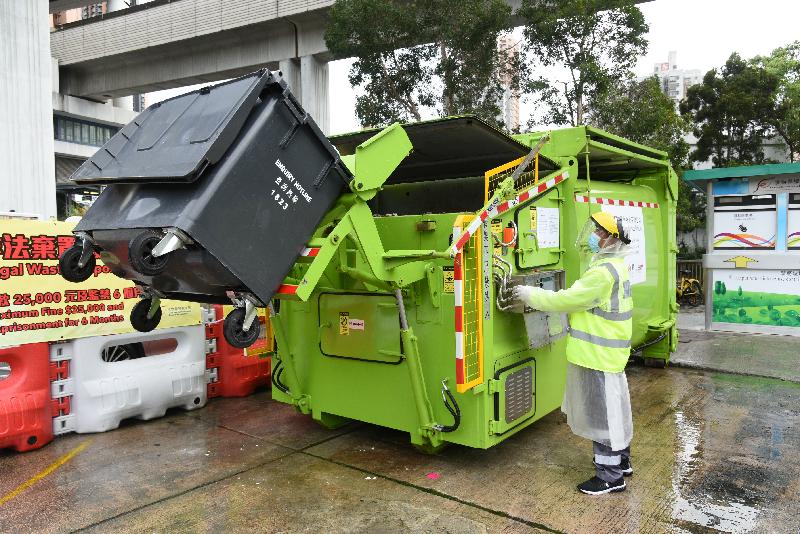FEHD launches pilot scheme for third-generation solar-powered refuse compacting devices (with photos)
******************************************************************************************
An FEHD spokesman said, "The FEHD has been proactively exploring how to leverage on technology to facilitate the public's disposal of household refuse so as to further improve environmental hygiene. The third-generation SCRBs can handle up to 600 litres of refuse and suit the use by residents in rural areas in the New Territories or in rural urban fringe areas without refuse collection points or facilities. The first batch of 12 SCRBs will be installed in Tsuen Wan District, Islands District and Southern District, followed by 12 others in Sai Kung District, North District, Tai Po District, Sha Tin District, Yuen Long District and Tuen Mun District in late October."
The FEHD conducted trial uses of the first- and second-generation SCRBs in 2018 and 2019 respectively. Stakeholders from the community generally supported the installation of the SCRBs and the FEHD improved the design and operation of the SCRBs in response to the feedback of the stakeholders. Previous features such as sensor-activated inlets, transparent inlet covers and indicators are adopted in the third-generation SCRBs, while enhancements have also been made in multiple ways, including improvement of the compacting ratio and processing time, enlargement of the inlets, and additional installation of ventilation, illumination and deodorisation facilities.
In addition, the FEHD is also proactively exploring technically feasible and cost-effective proposals acceptable to the community to improve environmental hygiene and pest control work in residential areas with a greater quantity of refuse. Since mid-2020, the FEHD has been implementing a trial scheme for use of solar-powered mobile refuse compactors (SMRCs), with a refuse handling capacity of 4 tonnes each, in Sham Shui Po and Yuen Long. The enclosed design can alleviate rodent infestation and pest problems.
In view of the different environments of the urban and New Territories areas, the ancillary facilities of the schemes have to suit the needs of the specific environments. Given design constraints and lack of management in some old tenement buildings in urban districts leading to environment problems, the FEHD has been implementing a three-month pilot project in Sham Shui Po, where SMRCs are placed at the junctions of Kiu Kiang Street and Hai Tan Street, as well as Shek Kip Mei Street and Yu Chau Street, so that nearby residents (such as residents of "three-nil" buildings) can conveniently use the facility to have their household refuse disposed of properly. The refuse collected in the SMRCs will be removed every night. In addition, the FEHD has been conducting a one-year pilot scheme in Yuen Long to place SMRCs near Town Park North Road Shui Pin Tsuen Refuse Collection Point, Ma Tin Tsuen Refuse Collection Point and Nam Pin Wai Refuse Collection Point to improve the refuse collection facilities, facilitate residents' disposal of refuse properly, and keep the environment clean and hygienic.
The spokesman said, "The FEHD will closely monitor the operation of SCRBs and SMRCs during the pilot scheme to assess the performance and effectiveness of the compacting devices, the enhancement of refuse collection service, the effectiveness of improving environmental hygiene in nearby areas and the feasibility of wider extension of the initiative to other districts."
The FEHD reminded the public and private waste collectors not to discard refuse at the side or on top of SCRBs/SMRCs, refuse bins or litter containers, and they should dispose of bagged refuse of a bigger size properly at refuse collection points. The spokesman stressed that keeping the environment clean and hygienic hinges on the active participation and sustained efforts of all parties in the community. He urged members of the public to be civic-minded and fulfil their civic responsibility in keeping Hong Kong clean and hygienic.
Ends/Tuesday, September 22, 2020
Issued at HKT 15:55
Issued at HKT 15:55
NNNN






